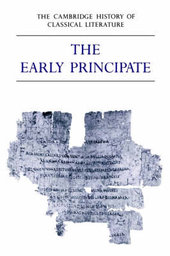
|
The Cambridge History of Classical Literature: Volume 2, Latin Literature, Part 4, The Early Principate
Paperback / softback
Main Details
| Title |
The Cambridge History of Classical Literature: Volume 2, Latin Literature, Part 4, The Early Principate
|
| Authors and Contributors |
Edited by E. J. Kenney
|
|
Edited by W. V. Clausen
|
| Series | The Cambridge History of Classical Literature |
|---|
| Physical Properties |
| Format:Paperback / softback | | Pages:252 | | Dimensions(mm): Height 228,Width 152 |
|
| Category/Genre | Literary studies - classical, early and medieval |
|---|
| ISBN/Barcode |
9780521273725
|
| Classifications | Dewey:880.09 |
|---|
| Audience | | Professional & Vocational | | Tertiary Education (US: College) | |
|---|
| Illustrations |
Worked examples or Exercises
|
|
Publishing Details |
| Publisher |
Cambridge University Press
|
| Imprint |
Cambridge University Press
|
| Publication Date |
14 July 1983 |
| Publication Country |
United Kingdom
|
Description
'Perfection is finality; finality is death'. The poets and prose writers of the first and early second centuries AD were not deterred by the towering stature of their Augustan predecessors from attempting new and often brilliant variations on the now traditional themes and genres. The so-called 'Silver' Age of Latin literature has tended to be characterized in terms of dismissive or question- begging stereotypes - 'decadent', 'rhetorical', 'baroque', 'mannerist' - as a substitute for close critical argument. From the sympathetic but searching appraisals in this volume the best writers of the age - Lucan, Seneca, Statius, Juvenal, Tacitus - emerge as men having something important to say and not merely technicians preoccupied with the most extravagant or paradoxical way of saying it. Complementary to these central figures as giving the age its special character and atmosphere are the minor poets, the satirists, the scholars and rhetoricians, the lesser historians, epistolographers and technical writers, whose varied activity provides the background to the main developments. The whole offers a detailed portrait of the literary interests of an age that was of necessity becoming increasingly more conscious of the past and of the problems of coping with its cultural heritage.
|